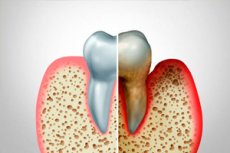New publications
Patients with periodontitis have a significantly increased risk of stroke before age 50
Last reviewed: 02.07.2025

All iLive content is medically reviewed or fact checked to ensure as much factual accuracy as possible.
We have strict sourcing guidelines and only link to reputable media sites, academic research institutions and, whenever possible, medically peer reviewed studies. Note that the numbers in parentheses ([1], [2], etc.) are clickable links to these studies.
If you feel that any of our content is inaccurate, out-of-date, or otherwise questionable, please select it and press Ctrl + Enter.

Periodontitis, an inflammation of the structures that support the teeth, significantly increases the risk of stroke in people under 50 with no known predisposing causes. A study in the Journal of Dental Research shows that the further the inflammation progresses in the mouth, the more severe the stroke.
Periodontitis is an inflammatory disease of the oral cavity that destroys the supporting structures of the teeth. A study led by the Department of Oral and Jaw Diseases at the University of Helsinki examined inflammatory changes associated with periodontitis and recent dental procedures in young stroke patients . The focus was on stroke survivors aged 20 to 50 years with no known predisposing factors for stroke.
"The incidence of such strokes has been increasing in recent decades," says associate professor and neurologist Jukka Putaala from Helsinki University Hospital (HUS).
"Previous studies have shown that periodontitis increases the risk of ischemic stroke, but there was no clear information about the significance of inflammation in the mouth in young patients who had a stroke without traditional causes," says university researcher Susanna Paiju from the University of Helsinki.
The study found that periodontitis was significantly more common among stroke patients than among healthy control subjects. Not only did periodontitis increase the risk of stroke, but its severity also influenced stroke severity.
Oral Microbes May Increase Blood Clotting
Dental procedures in the previous three months, such as tooth extraction or root canal treatment, as well as acute symptomatic inflamed teeth that had not yet been extracted, increased the risk of stroke, the study found.
"Oral microbes enter the bloodstream due to low-grade inflammation, but also in the short term due to dental procedures, especially if there is pre-existing inflammation in the mouth," says Payu.
"Normally the body clears these bacteria from the bloodstream," she adds.
Dental procedures and symptomatic bad teeth posed a particular risk for people with a hole known as a patent foramen ovale in the heart's atrial septum. The researchers believe the oval hole could contribute to the formation of blood clots that lead to strokes, as could bacteria entering the bloodstream from the mouth.
This foramen ovale is common and usually does not require treatment. However, its association with cerebral infarction has been observed in other studies, and closure procedures have been performed to prevent further infarctions.
The microbiome is important
The mouth contains the body's second-largest microbiome, or community of microbes such as bacteria, yeast, and viruses—only the gut has more. A healthy mouth has a balanced microbiome, but when periodontitis occurs, it changes and bad bacteria gain an advantage.
"A vicious circle is created where bacteria feed on tissues destroyed by inflammation. Their proliferation, in turn, increases the inflammation," says Professor of Translational Dentistry Pirkko Pussinen from the University of Eastern Finland.
Therefore, it is important to respond promptly to symptoms associated with periodontitis.
"Bad teeth should be removed and inflammation treated, and teeth should be checked regularly," confirms Payu.
